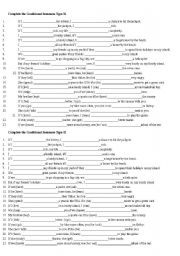

Note that with the verb To Be we use IF + I / HE / SHE / IT + WERE Notice how the comma is not necessary with this word order.
What would you do if you won the lottery?. Would you accept the job if they offered it to you?. Would she come if I paid for her flight?. We would have a lot of money if we sold our house. There would be fewer accidents if everyone drove more carefully. I would tell you the answer if I knew what it was.  I would be happy if I had more free time. We can also reverse the order and use: Conditional verb (would + verb) + If + Past Simple Notice how we use a comma after the past tense clause. (Though it is unlikely I will become President) If I became President, I would reduce the salaries of all politicians. If I didn't have a headache, I would go to the party. (Though I am unlikely to win the lottery) If I won the lottery, I would travel around the world. So in order for me to travel around the world, I would need the first clause (the condition or situation) to happen, that is, for me to win the lottery first.
I would be happy if I had more free time. We can also reverse the order and use: Conditional verb (would + verb) + If + Past Simple Notice how we use a comma after the past tense clause. (Though it is unlikely I will become President) If I became President, I would reduce the salaries of all politicians. If I didn't have a headache, I would go to the party. (Though I am unlikely to win the lottery) If I won the lottery, I would travel around the world. So in order for me to travel around the world, I would need the first clause (the condition or situation) to happen, that is, for me to win the lottery first. 
In that situation I would travel around the world. = It is unlikely that I will win the lottery, but I'm going to hypothetically imagine that I did win. The second clause of subject + would + verb (conditional verb) is conditional to the first clause happening (or will only happen if the first part/clause happens).Įxample: If I won the lottery, I would travel around the world. We use a past verb though are imagining the present or the future to be different. When we are thinking about a situation in the present or future that is hypothetical, unlikely or impossible, we use: If + Past Simple.







 0 kommentar(er)
0 kommentar(er)
